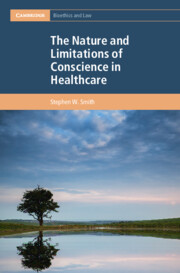Book contents
- The Nature and Limitations of Conscience in Healthcare
- Cambridge Bioethics and Law
- The Nature and Limitations of Conscience in Healthcare
- Copyright page
- Dedication
- Contents
- Table of Cases and Statutes
- Acknowledgements
- 1 Introduction
- 2 Conscience from First Principles
- 3 Respecting Conscience
- 4 Responsibilities of Conscience
- 5 Conscientious Provision and Objection
- 6 Complicity and Corporate Conscience
- 7 Regulating Claims of Conscience
- 8 Conclusion
- Bibliography
- Index
- Cambridge Studies in Bioethics and Health Law
4 - Responsibilities of Conscience
Published online by Cambridge University Press: 12 September 2025
- The Nature and Limitations of Conscience in Healthcare
- Cambridge Bioethics and Law
- The Nature and Limitations of Conscience in Healthcare
- Copyright page
- Dedication
- Contents
- Table of Cases and Statutes
- Acknowledgements
- 1 Introduction
- 2 Conscience from First Principles
- 3 Respecting Conscience
- 4 Responsibilities of Conscience
- 5 Conscientious Provision and Objection
- 6 Complicity and Corporate Conscience
- 7 Regulating Claims of Conscience
- 8 Conclusion
- Bibliography
- Index
- Cambridge Studies in Bioethics and Health Law
Summary
This fourth chapter begins by exploring one of the central problems with the description of conscience outlined in Chapter Two. If conscience is really a broad concept, then there is the possibility it can be used to severely limit patient choice. Chapter Four attempts to resolve this difficulty by arguing that conscience should not be protected as a right. Instead, it is an interest, and its protection should be based on whether the person claiming conscience acts responsibly in doing so. Three responsibilities of conscience are set out – humility, universality, and reciprocal respect. Each is shown to be crucial to the protection of conscience.
Information
- Type
- Chapter
- Information
- The Nature and Limitations of Conscience in Healthcare , pp. 62 - 81Publisher: Cambridge University PressPrint publication year: 2025
Accessibility standard: WCAG 2.2 AAA
Content Navigation
Allows you to navigate directly to chapters, sections, or non‐text items through a linked table of contents, reducing the need for extensive scrolling.
Provides an interactive index, letting you go straight to where a term or subject appears in the text without manual searching.
Reading Order & Textual Equivalents
You will encounter all content (including footnotes, captions, etc.) in a clear, sequential flow, making it easier to follow with assistive tools like screen readers.
Visual Accessibility
You will still understand key ideas or prompts without relying solely on colour, which is especially helpful if you have colour vision deficiencies.
You benefit from high‐contrast text, which improves legibility if you have low vision or if you are reading in less‐than‐ideal lighting conditions.
